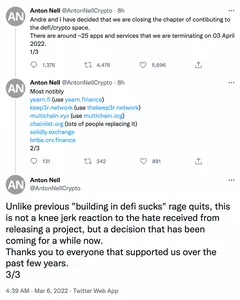A trader ends up owing $3600 after an exchange mistakenly deposits 10 Bitcoin in their account
NFT project created and endorsed by various English footballers plunges in value, players try to quietly delete endorsements
The plummeting price is not the only problem the project has faced; shortly after Terry announced the project in January, he was threatened with legal action by the Premier League, and had to remove depictions of Premier League, UEFA and FA trophies, as well as the Chelsea logo, from the NFT illustrations.
Bug in Fantasm Finance allows multiple exploiters to take more than $2.6 million
Crypto.com gives borrowers in some jurisdictions a week to pay back their loans
Reddit users from the UK, Germany, France, and Switzerland reported receiving the email, and those countries now all appear on the 40-entry-long list of countries not permitted to use Crypto.com's lending services. One Reddit user wrote, "I have 7 days to pay a big loan, like big. If it gave us a month I could unstake and pay, but no, they give us 7 [days], I will get liquified and can't do anything for it." Other users were confused to receive the email when they didn't have any loans on the platform, as it was worded in a way that they interpreted to mean they did.
- "Crypto.com Tells Loan Customers in 'Excluded' Countries to Repay by March 15", CoinDesk
- Tweet thread by Bitfinexed
- "Just a week after the ‘Earn’ debacle, Crypto.com fucks up again by announcing that anyone with a Crypto Loan needs to repay it within 7 days – or be forcibly liquidated via funds in their Spot Wallet. What planet are these idiots living on?" from r/Crypto_com
Ormeus Coin founder charged with securities fraud for misrepresenting cryptomining operations and other assets
- "John Barksdale Charged With Cryptocurrency Securities Fraud In Connection With Sale Of Ormeus Coin", U.S. Attorney’s Office, Southern District of New York
- SEC v. Barksdale
Founders of several 2017 cryptocurrency companies indicted for alleged theft of more than $40 million
- "Owners and Operators of Online Cryptocurrency Companies Indicted for Defrauding Investors", U.S. Attorney’s Office, Eastern District of New York
Over 10,000 NFTs of photographs by August Sander are delisted from OpenSea after being created without permission
The problem with this whole scheme is that Julian Sanders does not actually control the Sander estate — it was sold in 1992 by Gerd Sander (August's grandson, and Julian's father) to the Cultural Foundation of the Stadtsparkasse Cologne. That group was surprised to see all of Sander's work suddenly being sold as NFTs without their permission, and submitted a legal notice to have it taken down from OpenSea. OpenSea complied with the request on March 7. After almost two weeks of stalling and deflecting questions about the delisting without even acknowledging the cause, Fellowship and Julian Sander finally released a statement on the issue on March 18. Sander wrote that "a third party... claims to have certain rights in August Sanders' photographs" but that he "believe[s] the complaint is not valid" and would be working with his lawyers to have the collection reinstated. As best as I can tell, it seems that Sander is trying to argue he is entitled to sell his great-grandfather's work as NFTs because he physically possesses the negatives, despite the fact that the Cultural Foundation owns the usage rights to all of Sander's work.
Influencer Jake Paul alleged to be repeatedly promoting projects without disclosing his financial involvement
Paul allegedly tried to cover his steps by creating a new crypto wallet to receive payments for each promotion, but then transferred the money a wallet he controlled to cash out. Oops. Some of the projects that Paul hyped in his undisclosed promotions included League of Sacred Devils, $MILF, and $YUMMY.
- "Exposing Jake Paul's Scams", YouTube video by CoffeeZilla

![Email to rifftrader, which reads: "Good Afternoon [redacted] Please advise on how you plan to satisfy the debit balance on your account? There was a credit of Crypto currency entered in your account in error and you proceeded to trade on those funds which did not belong to you. If we do not receive payment ofr $3,632.90 by tomorrow, this will be sent to our debt collection agency to be pursued further."](https://primary-cdn.web3isgoinggreat.com/entryImages/resized/rifftrader_300.webp)






